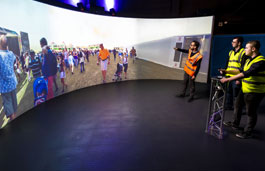Search
Renewable Energy BSc (Hons)
Study level: Undergraduate
Our undergraduate degree in Renewable Energy covers this large and vital sector exploring a range of social, economic and environmental issues with a range of skills and approaches.
Course option
Year of entry
Location
Coventry University (Coventry)
Study mode
Full-time
Part-time
Sandwich
Duration
3 years full-time
4 years sandwich
6 years part-time
UCAS codes
HN86
Start date
September 2024
Course overview
The course will introduce you to the management of energy system transitions.
- Learning is centred around renewable energy production, how rapid technological advancements are changing the way that renewable energy is being generated and supplied, and the social and environmental impacts of these processes.
- You will learn five core themes including Project Management, Data Analysis and Management, Energy Economics, Health, Safety and Environment and Technology.
- The final year of study allows you to undertake a project of your choice (within the broad field of Renewable Energy).
Rated Gold Overall
Teaching Excellence Framework (TEF) 20235 QS Stars for Teaching and Facilities
QS Stars University RatingsTop 5 Student City in England (Coventry)
QS Best Student Cities Index 2025Why you should study this course
- Fieldwork/site visits (in person or virtual) involving research skills are present in all years. After diverse applied fieldwork and learning experiences, students should be particularly well placed to apply and carry out a wide range of demanding year-long sandwich placements in industry, government or in an overseas learning establishment2.
- The typical positive interaction between students and staff, and the supportive environment allows students to develop through the academic, personal and professional skills modules at each level.
- The course makes use of the Simulation Centre, a facility that allows simulation of real-life work-place scenarios, all within a monitored and recorded environment that allows students to develop skills and receive immediate feedback on their development. Simulated exercises help to prepare our students for the challenges of the professional world and ease the transition into the workplace after graduation4.
What you'll study
We regularly review our course content, to make it relevant and current for the benefit of our students. For these reasons, course modules may be updated. Before accepting any offers, please check the website for the most up to date course content.
How you'll learn
You will be taught by current experienced, qualified teaching staff who bring professional and research expertise into their teaching. Field trips2 which occur in each year, provide an unrivalled opportunity to contextualise classroom-based learning and develop practical skills through real-life application. In addition to the residential field trips, you will have opportunity to undertake a range of day trips to gain practical experience of applying your knowledge.
This course can be offered on a part-time basis. Whilst we would like to give you all the information about our part-time offering here, it is tailored for each course each year depending on the number of part-time applicants. Therefore, the part-time teaching arrangements vary. Request further information about part-time study.
Teaching contact hours
We understand that everyone learns differently, so each of our courses will consist of structured teaching sessions, which includes:
- On campus lectures, seminars and workshops
- Group work
- Self-directed learning
- Work placement opportunities2
The number of contact hours may vary from semester to semester, however, on average, it is likely to be around 14-15 contact hours per week in the first and second year dropping to around 11 contact hours per week in the final year as you become a more independent learner.
In addition, you will be expected to undertake approximately 30-35 hours of self-directed study per week depending on the demands of individual modules. This self-directed learning allows you to use your research skills, consolidate your knowledge or undertake collaborative group work.
As an innovative and enterprising institution, the university may seek to utilise emerging technologies within the student experience. For all courses (whether on-campus, blended, or distance learning), the university may deliver certain contact hours and assessments via online technologies and methods.
Since COVID-19, we have delivered our courses in a variety of forms, in line with public authority guidance, decisions, or orders and we will continue to adapt our delivery as appropriate. Whether on campus or online, our key priority is staff and student safety.
Assessment
This course will be assessed using a variety of methods which will vary depending upon the module.
Assessment methods may include:
- Formal examinations
- Phase tests
- Essays
- Group work
- Presentations
- Reports
- Projects
- Coursework
- Exams
- Individual assignments
- Laboratories
The Coventry University Group assessment strategy ensures that our courses are fairly assessed and allows us to monitor student progression towards achieving the intended learning outcomes.
International experience opportunities
International field trip in year three2.
Entry requirements
Typical offer for 2024/25 entry.
Not got the required grades? We offer this degree with an integrated foundation year.
Fees and funding
2024/25 tuition fees.
| Student | Full-time | Part-time |
|---|---|---|
| UK, Ireland*, Channel Islands or Isle of Man | £9,250 per year | Request fee information |
| EU | £9,250 per year with EU Support Bursary** £19,850 per year without EU Support Bursary** |
Not available |
| International | £19,850 per year | Not available |
If you choose to do a work placement2, you should consider travel and living costs to cover this. There is also a tuition fee3 of £1,250 that will cover your academic support throughout your placement year.
For advice and guidance on tuition fees and student loans visit our Undergraduate Finance page and see The University’s Tuition Fee and Refund Terms and Conditions.
We offer a range of International scholarships to students all over the world. For more information, visit our International Scholarships page.
Tuition fees cover the cost of your teaching, assessments, facilities and support services. There may be additional costs not covered by this fee such as accommodation and living costs, recommended reading books, stationery, printing and re-assessments should you need them. Find out what's included in your tuition costs.
The following are additional costs not included in the tuition fees:
- Optional international field trips: £400+ per trip.
- Any costs associated with securing, attending or completing a placement (whether in the UK or abroad).
Other additional costs
- Mandatory international field trips: Typically between £200 and £400 per trip
*Irish student fees
The rights of Irish residents to study in the UK are preserved under the Common Travel Area arrangement. If you are an Irish student and meet the residency criteria, you can study in England, pay the same level of tuition fees as English students and utilise the Tuition Fee Loan.
**EU Support Bursary
Following the UK's exit from the European Union, we are offering financial support to all eligible EU students who wish to study an undergraduate or a postgraduate degree with us full-time. This bursary will be used to offset the cost of your tuition fees to bring them in line with that of UK students. Students studying a degree with a foundation year with us are not eligible for the bursary.
Facilities
The £50m Engineering and Computing Building and new £25m Beatrice Shilling Building are designed to support hands-on learning. Our Sir John Laing Building also houses a variety of industry-standard labs and equipment4.
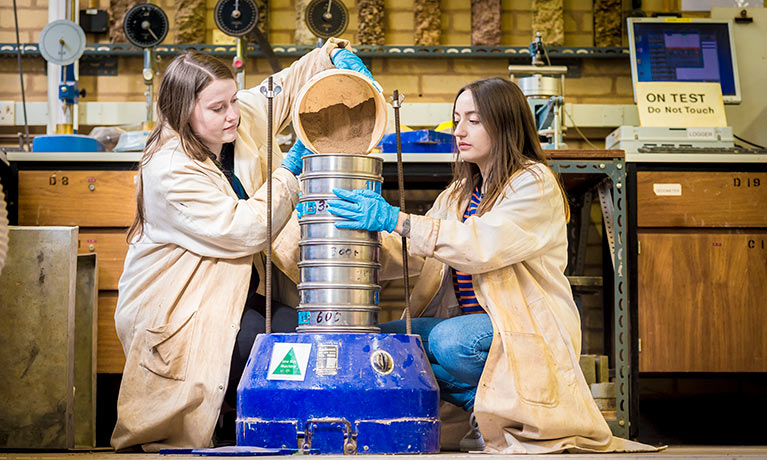
Geotechnics Laboratory
Contains triaxial cells, direct shear box apparatus, a dimensional compression oedometer, California Bearing Ratio apparatus, soil classification equipment and Marshall test apparatus for asphalt mixes.

Computer Laboratory
This computer laboratory is equipped with access to ArcGIS for mapping and geographical information systems. It is also equipped with Petrel/Eclipse software for oil and gas reservoir simulation and calculation.
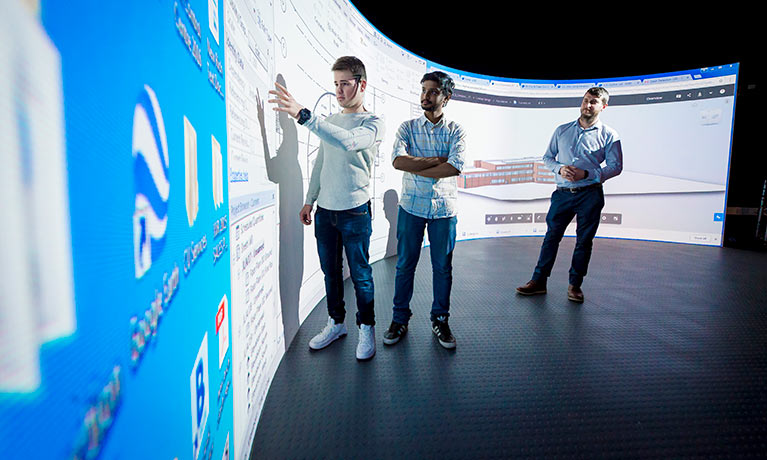
Simulation Centre
Our interactive training centre is used to create a ‘virtual’ construction site with fully-equipped site cabins and observation deck. Students undertake role play exercises to help prepare them for situations in the workplace.
Careers and opportunities
On successful completion of the course, students will be able to:
- Demonstrate a sound understanding of the components of the global energy system including energy sources, generation and integration technologies, supply chains, and end-uses (electricity, transportation, heating/cooling).
- Critically evaluate potential renewable energy and energy management projects, and subsequently support their planning, financing, management and operation within a changing energy market.
- Understand the importance of and apply appropriate techniques in multi-stakeholder engagement, communication, and co-operation in aspects of policy, project implementation and management.
- Critically analyse the challenges and strategies (short-term and long-term) in transitioning towards decarbonised energy systems with a focus on energy supply, efficiency/conservation, storage and disruptive technologies.
- Evaluate the issues and techniques involved in collecting, analysing and communicating energy data, and demonstrate research design and execution skills within renewable energy-related topics.
- Demonstrate personal skills and competencies expected of an energy sector professional, including operating within individual and team settings, including digital fluency and written, oral, visual, and numerical skills.
The breadth and blend of academic discipline covered in this course – the combination of social and environmental science; economics; health, safety and environment (HSE); and technical/engineering issues of energy demand and supply - are a strong mix of skills highlighted by Natural Environment Research Council as being essential.
Graduate Immigration Route visa
Based on current information from the UK Government, international students whose study extends beyond summer 2021 may be eligible for a visa under the UK Government’s Graduate Immigration Route, which will enable students to stay and work, or look for work, in the UK at any skill level for up to two (2) years. Check the most up to date guidance available to check your eligibility and any updates from the UK Government before making an application or enrolment decision.
How to apply
You may also like
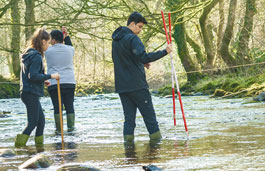
Geography BA (Hons)
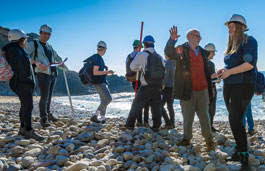
Geography and Environmental Hazards BSc (Hons)
